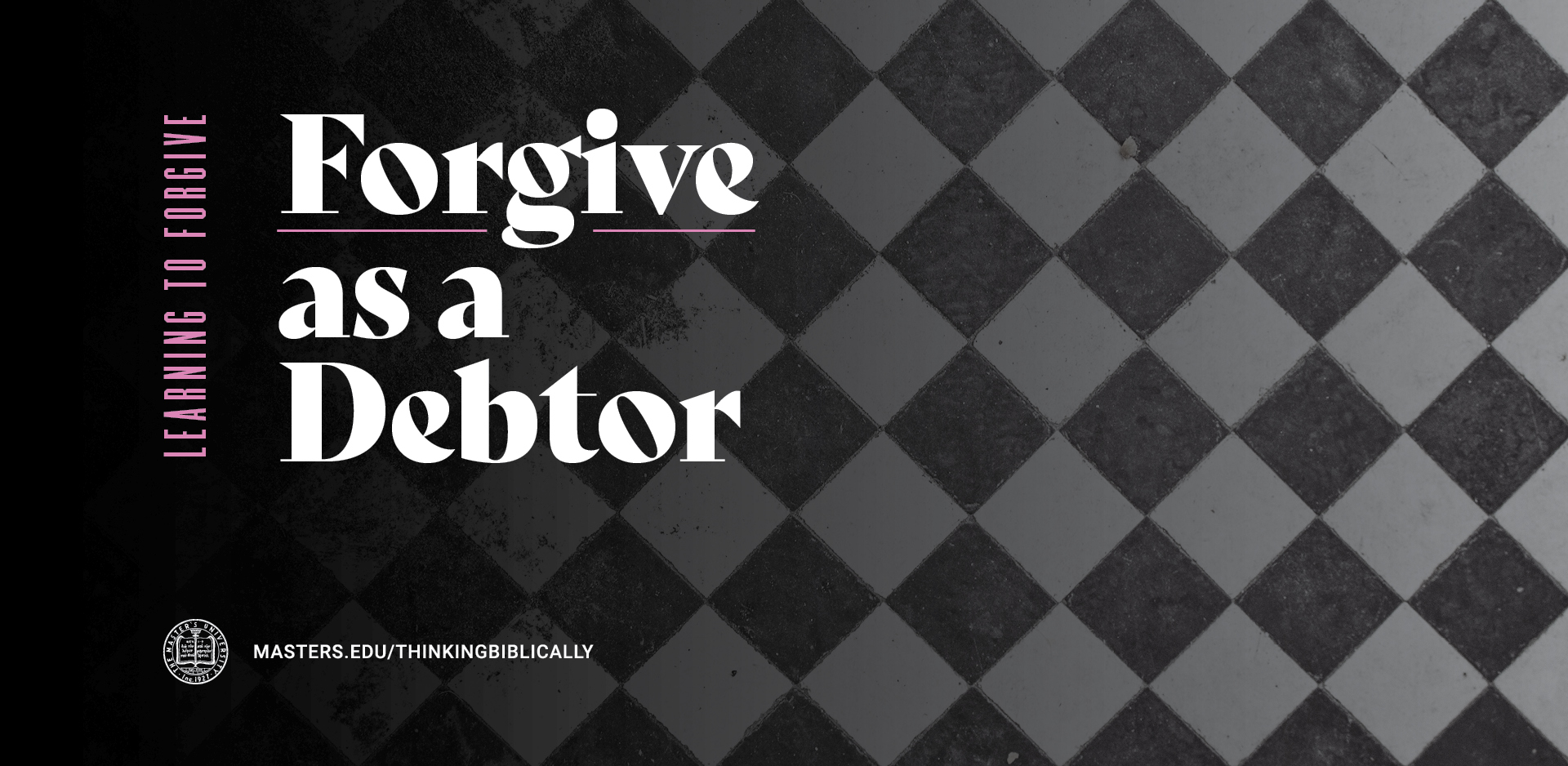
Forgiveness is bold. It is brave. It is heroic. But at the same time it should be normal for a humble Christian. And why is that? What is our motivation for forgiving others?
Paul closes the letter to Philemon with some gracious but pregnant words meant to excite the heart of Philemon to forgive Onesimus. And each one of his final remarks carries in it the embryo of a truth that acts as motivation for us to forgive.
What, then, motivates us to forgive? Firstly, it is the recognition that we ourselves owe debts we can’t pay:
But if he has wronged you in any way or owes you anything, charge that to my account; I, Paul, am writing this with my own hand, I will repay it (not to mention to you that you owe to me even your own self as well) (Philemon 18-19).
This is the issue of restitution. Paul knows Onesimus has nothing. He can’t repay what he stole. So Paul offers to repay the debt himself.
But then, notice what he says right after: Philemon owes Paul. Paul says, “By the way, I know Onesimus owes you a debt. But may I remind you that you owe me a greater debt than he owes you?” Here’s Paul’s plan: “Put his debt on my account, and then cancel it, because you owe me so much.”
Philemon is not just a man who is owed the payment of a debt. Philemon is also a debtor who owes a far greater and unpayable debt to Paul.
Onesimus owes Philemon a material debt. Philemon owes Paul a spiritual debt. Onesimus owes Philemon a temporal debt. Philemon owes Paul an eternal debt.
Why? Paul had given Philemon the gospel. Paul had led him to the saving knowledge of Jesus Christ. How is Philemon ever going to pay that back? So, Paul says that Onesimus’s debt should be put on his account and then canceled, because Philemon owed Paul so much for being God’s messenger to deliver him from death and hell.
When somebody offends you or owes you something, remember this: You owe unpayable debts to others who have generously, graciously, faithfully, and lovingly benefited you with the richest of spiritual blessings. They don’t demand payment, and you couldn’t pay them back if they did. So can’t you release the debt of one who has offended you?
I’m in debt to many people. I’m so deeply in debt to so many people for so much that I could never come close to repaying it.
I’m in debt to my mother and father, who led me to the knowledge of Jesus Christ. I’m in debt to them for teaching me the Scriptures. I’m in debt to them for leading me into ministry. I’m in debt to them for supporting me, supplying my needs, and educating me. I’m in debt to them for holding me to a disciplined life and making me spiritually accountable for my behavior. I could never repay my debt to my parents.
I’m in debt to my wife for her friendship, love, support, wisdom, input, correction, and convictions. I’m in debt to my children for loving me even in my weaknesses. I’m in debt to a whole world of friends who have ministered to me graciously. I’m in debt to my teachers. I’m in debt to men who have written books that shaped my life, my thinking, and my ministry.
I am so deeply in debt to so many people for so much spiritual blessing that I could never repay it all. Never. Only God can pay them back.
Can I, then, who owes so much to so many, not forgive someone who owes a simple earthly debt to me?
Do you see Paul’s point? Since I have so many spiritual debts that I can never repay, can I not gladly allow some material debt to go unpaid and fully forgive the one who owes it? In this way, Paul seeks to motivate us to forgive by reminding us of how much we owe. And in the next post I will look at two more motivations for forgiveness.
This post is based on a sermon Dr. MacArthur preached in 1991, titled “The Motives of One Who Forgives.”

The Master’s University and Seminary admit students of any race, color, national and ethnic origin to all the rights, privileges, programs, and activities generally accorded or made available to students at the school. It does not discriminate on the basis of race, color, national and ethnic origin in the administration of its educational policies, admissions policies, scholarship and loan programs, and athletic and other school-administered programs.
21726 Placerita Canyon Road
Santa Clarita, CA 91321
1-800-568-6248
© 2025 The Master’s University Privacy Policy Copyright Info
| Cookie | Duration | Description |
|---|---|---|
| cookielawinfo-checkbox-analytics | 11 months | This cookie is set by GDPR Cookie Consent plugin. The cookie is used to store the user consent for the cookies in the category "Analytics". |
| cookielawinfo-checkbox-functional | 11 months | The cookie is set by GDPR cookie consent to record the user consent for the cookies in the category "Functional". |
| cookielawinfo-checkbox-necessary | 11 months | This cookie is set by GDPR Cookie Consent plugin. The cookies is used to store the user consent for the cookies in the category "Necessary". |
| cookielawinfo-checkbox-others | 11 months | This cookie is set by GDPR Cookie Consent plugin. The cookie is used to store the user consent for the cookies in the category "Other. |
| cookielawinfo-checkbox-performance | 11 months | This cookie is set by GDPR Cookie Consent plugin. The cookie is used to store the user consent for the cookies in the category "Performance". |
| viewed_cookie_policy | 11 months | The cookie is set by the GDPR Cookie Consent plugin and is used to store whether or not user has consented to the use of cookies. It does not store any personal data. |
Notifications